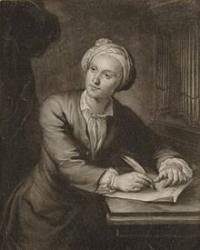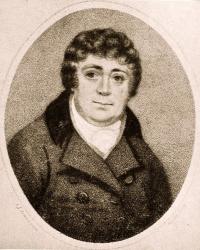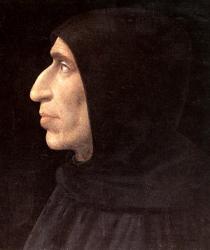Planning worship?
Check out our sister site, ZeteoSearch.org,
for 20+ additional resources related to your search.
- |
User Links
Person Results
Thomas John Williams
1869 - 1944 Person Name: Thomas John Williams, 1869-1944 Scripture: Isaiah 50:4-9 Composer of "EBENEZER" in Common Praise (1998) Although his primary vocation was in the insurance business, Thomas John Williams (b. Ynysmeudwy, Glamorganshire, Wales, 1869; d. Llanelly, Carmarthenshire, Wales, 1944) studied with David Evans at Cardiff and later was organist and choirmaster at Zion Chapel (1903-1913) and Calfaria Chapel (1913-1931), both in Llanelly. He composed a number of hymn tunes and a few anthems.
Bert Polman
Thomas John Williams
John Frederick Lampe

1703 - 1751 Person Name: J. F. Lampe Scripture: Isaiah 50:8 Composer of "KENT" in Rejoice in the Lord John Frederick Lampe (born Johann Friedrich Lampe; probably 1703 – 25 July 1751) was a musician.
He was born in Saxony, but came to England in 1724 and played the bassoon in opera houses. His wife, Isabella Lampe, was sister-in-law to the composer Thomas Arne with whom Lampe collaborated on a number of concert seasons. John and Isabella's son, Charles John Frederick Lampe, was a successful organist and composer as well.
Like Arne, Lampe wrote operatic works in English in defiance of the vogue for Italian opera popularised by George Frideric Handel and Nicola Porpora. Lampe, along with Henry Carey and J. S. Smith, founded the short-lived English Opera Project. He became a friend of Charles Wesley, and wrote several tunes to accompany Wesley's hymns. His works for the stage include the mock operas Pyramus and Thisbe (1745) and The Dragon of Wantley (1734), which ran for 69 nights, a record for the time, surpassing The Beggar's Opera. He was based for a time in Dublin and later in Edinburgh, where he died.
--en.wikipedia.org/wiki/
See also in:
Wikipedia
John Frederick Lampe
Samuel Arnold

1740 - 1802 Person Name: Samuel Arnold. 1740-1802 Scripture: Isaiah 50:4 Composer of "LEAMINGTON" in Singing the Faith Dr. Samuel Arnold, an English musician and composer; born in London, Aug. 10, 1739; composed for the theatre, the church, and also oratorio music; succeeded Dr. Nares as organist; died at Westminster, Oct. 22, 1802.
A Dictionary of Musical Information by John W. Moore, Boston: Oliver, Ditson & Company, 1876
Samuel Arnold
Ian Howarth
b. 1955 Person Name: Ian Howarth, b. 1955 Scripture: Isaiah 50:4 Composer of "EFFINGHAM" in Singing the Faith
Ian Howarth
Lowell Mason

1792 - 1872 Person Name: Lowell Mason, 1792-1872 Scripture: Isaiah 50:4-5 Composer of "OTTAWA" in Together in Song Dr. Lowell Mason (the degree was conferred by the University of New York) is justly called the father of American church music; and by his labors were founded the germinating principles of national musical intelligence and knowledge, which afforded a soil upon which all higher musical culture has been founded. To him we owe some of our best ideas in religious church music, elementary musical education, music in the schools, the popularization of classical chorus singing, and the art of teaching music upon the Inductive or Pestalozzian plan. More than that, we owe him no small share of the respect which the profession of music enjoys at the present time as contrasted with the contempt in which it was held a century or more ago. In fact, the entire art of music, as now understood and practiced in America, has derived advantage from the work of this great man.
Lowell Mason was born in Medfield, Mass., January 8, 1792. From childhood he had manifested an intense love for music, and had devoted all his spare time and effort to improving himself according to such opportunities as were available to him. At the age of twenty he found himself filling a clerkship in a banking house in Savannah, Ga. Here he lost no opportunity of gratifying his passion for musical advancement, and was fortunate to meet for the first time a thoroughly qualified instructor, in the person of F. L. Abel. Applying his spare hours assiduously to the cultivation of the pursuit to which his passion inclined him, he soon acquired a proficiency that enabled him to enter the field of original composition, and his first work of this kind was embodied in the compilation of a collection of church music, which contained many of his own compositions. The manuscript was offered unavailingly to publishers in Philadelphia and in Boston. Fortunately for our musical advancement it finally secured the attention of the Boston Handel and Haydn Society, and by its committee was submitted to Dr. G. K. Jackson, the severest critic in Boston. Dr. Jackson approved most heartily of the work, and added a few of his own compositions to it. Thus enlarged, it was finally published in 1822 as The Handel and Haydn Society Collection of Church Music. Mason's name was omitted from the publication at his own request, which he thus explains, "I was then a bank officer in Savannah, and did not wish to be known as a musical man, as I had not the least thought of ever making music a profession." President Winchester, of the Handel and Haydn Society, sold the copyright for the young man. Mr. Mason went back to Savannah with probably $500 in his pocket as the preliminary result of his Boston visit.
The book soon sprang into universal popularity, being at once adopted by the singing schools of New England, and through this means entering into the church choirs, to whom it opened up a higher field of harmonic beauty. Its career of success ran through some seventeen editions. On realizing this success, Mason determined to accept an invitation to come to Boston and enter upon a musical career. This was in 1826. He was made an honorary member of the Handel and Haydn Society, but declined to accept this, and entered the ranks as an active member. He had been invited to come to Boston by President Winchester and other musical friends and was guaranteed an income of $2,000 a year. He was also appointed, by the influence of these friends, director of music at the Hanover, Green, and Park Street churches, to alternate six months with each congregation. Finally he made a permanent arrangement with the Bowdoin Street Church, and gave up the guarantee, but again friendly influence stepped in and procured for him the position of teller at the American Bank.
In 1827 Lowell Mason became president and conductor of the Handel and Haydn Society. It was the beginning of a career that was to win for him as has been already stated the title of "The Father of American Church Music." Although this may seem rather a bold claim it is not too much under the circumstances. Mr. Mason might have been in the average ranks of musicianship had he lived in Europe; in America he was well in advance of his surroundings. It was not too high praise (in spite of Mason's very simple style) when Dr. Jackson wrote of his song collection: "It is much the best book I have seen published in this country, and I do not hesitate to give it my most decided approbation," or that the great contrapuntist, Hauptmann, should say the harmonies of the tunes were dignified and churchlike and that the counterpoint was good, plain, singable and melodious.
Charles C. Perkins gives a few of the reasons why Lowell Mason was the very man to lead American music as it then existed. He says, "First and foremost, he was not so very much superior to the members as to be unreasonably impatient at their shortcomings. Second, he was a born teacher, who, by hard work, had fitted himself to give instruction in singing. Third, he was one of themselves, a plain, self-made man, who could understand them and be understood of them."
The personality of Dr. Mason was of great use to the art and appreciation of music in this country. He was of strong mind, dignified manners, sensitive, yet sweet and engaging.
Prof. Horace Mann, one of the great educators of that day, said he would walk fifty miles to see and hear Mr. Mason teach if he could not otherwise have that advantage.
Dr. Mason visited a number of the music schools in Europe, studied their methods, and incorporated the best things in his own work. He founded the Boston Academy of Music. The aim of this institution was to reach the masses and introduce music into the public schools. Dr. Mason resided in Boston from 1826 to 1851, when he removed to New York. Not only Boston benefited directly by this enthusiastic teacher's instruction, but he was constantly traveling to other societies in distant cities and helping their work. He had a notable class at North Reading, Mass., and he went in his later years as far as Rochester, where he trained a chorus of five hundred voices, many of them teachers, and some of them coming long distances to study under him. Before 1810 he had developed his idea of "Teachers' Conventions," and, as in these he had representatives from different states, he made musical missionaries for almost the entire country. He left behind him no less than fifty volumes of musical collections, instruction books, and manuals.
As a composer of solid, enduring church music. Dr. Mason was one of the most successful this country has introduced. He was a deeply pious man, and was a communicant of the Presbyterian Church. Dr. Mason in 1817 married Miss Abigail Gregory, of Leesborough, Mass. The family consisted of four sons, Daniel Gregory, Lowell, William and Henry. The two former founded the publishing house of Mason Bros., dissolved by the death of the former in 19G9. Lowell and Henry were the founders of the great organ manufacturer of Mason & Hamlin. Dr. William Mason was one of the most eminent musicians that America has yet produced.
Dr. Lowell Mason died at "Silverspring," a beautiful residence on the side of Orange Mountain, New Jersey, August 11, 1872, bequeathing his great musical library, much of which had been collected abroad, to Yale College.
--Hall, J. H. (c1914). Biographies of Gospel Song and Hymn Writers. New York: Fleming H. Revell Company.
Lowell Mason
Girolamo Savonarola

1452 - 1498 Person Name: Girolamo Savonarola, 1452-1498 Scripture: Isaiah 50:4 Author of "Jesus, Refuge of the Weary" in Christian Worship Savonarola, Girolamo, p. 1533, i. His hymns were printed in a collected form as Poesie di Fra Girolamo Savonarola tratte dall’ Autografo, at Florence, 1862. A number of them had appeared in Fra Serafino Razzi's Laudl Spirituali, Venice, 1563, and elsewhere. The best-known is:—
Giesu sommo conforto. [Passiontide.] This is in 1862 as above, No. xii., p. 27, entitled "Praise to the Crucified." Also in Razzi, 1563, f. 4, in Eugenia Levi's Lirica Italiana Antica, Florence, 1905, p. 118, &c. Translated as "Jesus, Refuge of the weary," by Jane Francesca Wilde. Contributed to R. R. Madden's Life and Martyrdom of Savonarola, 1853, i., p. 376; reprinted in her own Poems by Speranza, Dublin, 1864, p. 199. See further p. 1574, ii. [Rev. James Mearns, M.A.]
--John Julian, Dictionary of Hymnology, New Supplement (1907)
Girolamo Savonarola
Lady Wilde
1826 - 1896 Person Name: Jane F. Wilde, 1826-1896 Scripture: Isaiah 50:4 Translator of "Jesus, Refuge of the Weary" in Christian Worship Wilde, Jane Francesca, née Elgee. Lady Wilde was daughter of Archdeacon Elgee, born at Wexford in 1826; married Dr., afterwards Sir, William Wilde, the Dublin oculist, 1851; and died at Chelsea, Feb. 3, 1896. [Rev. James Mearns, M.A.]
--John Julian, Dictionary of Hymnology, New Supplement (1907)
======================
Wilde, Jane Francesca Elgee, Lady, 1826-1896; usage: Lady Wilde ("Speranza") began contrib. verse/prose to "The nation" using pseud. "John Fanshawe Ellis" or "Speranza"; 1851: married William Wilder (1864 knighted); Jane Wilde d. 3 Feb. 1896
LOC Name Authority
Lady Wilde
Richard Massie
1800 - 1887 Person Name: Richard Massie, 1800-87 Scripture: Isaiah 50:7-9 Translator (sts. 2, 6-9) of "If God Himself Be for Me" in Lutheran Service Book Massie, Richard, eldest son of the Rev. R. Massie, of Goddington, Cheshire, and Rector of Eccleston, was born at Chester, June 18, 1800, and resides at Pulford Hall, Coddington. Mr. Massie published a translation of Martin Luther’s Spiritual Songs, London, 1854. His Lyra Domestica, 1st series, London, 1860, contains translations of the 1st Series of Spitta's Psalter und Harfe. In 1864 he published vol. ii., containing translations of Spitta's 2nd Series, together with an Appendix of translations of German hymns by various authors. He also contributed many translations of German hymns to Mercer's Church Psalter & Hymn Book; to Reid's British Herald; to the Day of Rest, &c. He died Mar. 11,1887.
-- John Julian, Dictionary of Hymnology (1907)
Richard Massie
Michael Saward
1932 - 2015 Person Name: Michael Saward, b. 1932 Scripture: Isaiah 50:4-9 Author of "Yours the glory and the crown" in Singing the Faith Michael John Saward (b. Blackheath, Kent, England, 1932) was residentiary Canon of St. Paul's Cathedral, London, and a church commissioner and member of the general synod of the Church of England. Educated at Eltham College, Bristol University, and Tyndale Hall, he was ordained in the Church of England in 1956. Saward served in several congregations and was radio and television officer for the Church Information Office (1967-1972). His publications include Leisure (1963), Couldn’t Care Less (1966), Don't Miss the Party (1974), and All Change (1983). Associated with the Jubilate Group for a number of years, he has written some sixty hymns and served as text editor for Hymns for Today's Church (1982).
Bert Polman
Michael Saward
John Barnard
b. 1948 Person Name: John Barnard, b. 1948 Scripture: Isaiah 50:4-9 Composer of "GUITING POWER" in Singing the Faith
John Barnard


 My Starred Hymns
My Starred Hymns


